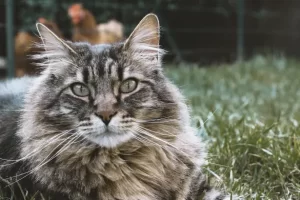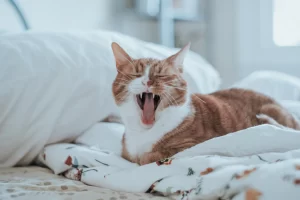Last updated on January 16th, 2023 at 03:04 am

One of the biggest questions of cat owners is, “why does my cat lick and bite me?”. The majority of people who own cats have been in such situations. You’re having a fantastic time cuddling with your cat; they are lovingly licking you and purring while you snuggle on the couch. All of a sudden, and without any prior notice, you find a set of teeth firmly embedded in your arm, and this is typically accompanied by furious clawing from your cat! Or, it’s possible that after she licks you, your cat will give you nibbles that are forceful but not violent.
You are not the only one who is pondering the reasons for this behavior from your cat or whether or not you did something wrong. This trait is exhibited by each and every breed of domestic cat. This article will discuss the possible meanings of this behavior, the common reasons behind it, and ways to assist in reducing it.
Why do cats enjoy biting so much?
There are a few different motivations for why cats enjoy biting. To give just one example, it might take the form of a game. Play fighting is a common activity for kittens and young cats to engage in when they are together in a litter. Cats may also show their hunting instincts by biting as a way to communicate with their environment. The usual biting behavior includes a cat biting your hair.
However, there are certain cats that will bite out of fear or aggressiveness. When a cat perceives that it is in danger, it may lash out and bite as a method of protecting itself. If a cat is not properly socialized, it runs the risk of becoming hostile and biting people or other animals.
It is essential that you find a way to prevent your cat from biting, regardless of the reason. If you get a kitten, you should provide it with plenty of toys to play with so that it won’t feel the urge to bite anyone, even you. Seek the assistance of a behaviorist or your veterinarian if you believe that your cat is biting out of aggressive behavior.
How come cats lick me all the time?
There are a few potential explanations as to why your cat is licking you. One of the reasons could be that they are reaching out to express their affection for you. People are frequently licked by cats as a form of grooming and as a sign of their affection for the person.
It’s also possible that your cat is licking you because they are anxious or stressed out. In times of stress, cats may lick themselves as a means of coping with the situation. If you notice that your cat is licking you more frequently than usual, it is probably a good idea to take them to the veterinarian so that they can determine whether or not there are any underlying health issues that are contributing to their agitation. Last but not least, some cats do it because they adore the flavor of human skin. If your cat is continually licking you, it’s probably time to provide them with a little bit more love and attention. It’d be that all they want is more quality time with you.
Why Does My Cat Lick Me And Bite Me?
Here are some other reasons why cat licks and bite their owners.
Love Biting
The study of feline behavior is yet incomplete. There are a few hypotheses as to why cats may bite when being petted, yet we do not always have full knowledge of why cats act as they do.
It is entitled “Love Biting.” Some cats will offer their owner a mild bite or nip as a sign of affection. This behavior typically occurs when cats feel linked to their humans and resembles that of both kittens and adult cats. Typically, these little love bites are not accompanied by warning behaviors, and your cat may appear at peace.
Play-Related Aggression
Cats might become very eager while playing at times. They may also require some time to calm down after finishing. This is particularly appropriate for kittens, although it can also apply to older cats. It should come as no surprise that in each of those scenarios, a cat may lick and then bite you. These are not aggressive behaviors, but rather typical patterns of conduct.
Overstimulating them can set off their emotions and cat instincts, leading to play-related aggressiveness that may end in a lick, and sometimes followed by a bite. If you give them time to absorb that playing is finished, they will generally settle down on their own, eventually returning to the lazy cat life, which usually includes the obligatory nap time.
Grooming
As was said earlier, licking is considered a grooming behavior. When cats groom one another, they often expand this behavior to include gentle nibbling, which can help clear up little hair mats or particles of dirt. Cats do this for a variety of reasons. It’s possible that your cat is grooming you as a kind of social interaction and bonding if it licks and nibbles at your skin gently.
Also read: Best Grooming Tools Every Cat Owner Wants
Frustration
The feeling of being unable to do what they want to do is a common example of a negative emotional drive-in cats. Their “frustration system” might be set off when their expectations are not met, when they are unable to get their hands on resources that they desire, or when they feel as though they are losing control.
It’s possible that your cat will resort to biting you if they’re frustrated during a petting session since the interaction isn’t going the way they want it to. These bites are typically delivered with more force or aggression than those delivered in the context of play or affection. Increasing the amount of time spent playing can help lessen the behaviors associated with frustration.
Pain
It is also a well-known fact that it is possible for cats to bite their humans during a session of cuddling if they are in pain or uncomfortable. It is well known that cats have the ability to mask their suffering, which is an evolutionary feature that serves to conceal any signals of vulnerability. Consult your neighborhood veterinarian for guidance if you are unsure whether or not your cat is experiencing any discomfort, particularly if your cat is senior or suffers from a health condition that is ongoing.
How Should you React if Your Cat Suddenly Lick and Bite You?
There’s no reason to be concerned if your cat is merely licking you and occasionally biting you. This is most likely just how they play. However, if your cat does it on a regular basis, you should take them to the vet to rule out any medical concerns. You can also teach your cat to stop this behavior. One method is to simply ignore them when they do it. Cats frequently bite to obtain attention, thus ignoring them will deprive them of the reward they seek. When they bite you, another option is to offer them a firm “no.” This will make them realize that their behavior is unacceptable. Finally, you may try a bitter spray or a citronella collar to keep them from biting.
Bitter sprays and citronella collars are both safe and efficient methods of teaching your cat not to lick and bite you. Bitter sprays contain a bitter ingredient that deters your cat from licking and biting. When your cat bites, citronella collars release a small amount of citronella oil, which deters them from doing it again. If you are concerned about your cat’s biting behavior, you should seek the advice of a veterinarian or animal behaviorist. They will be able to assist you in determining what is causing the issue and how to resolve it.
If your cat licks you and then bites you, avoid criticizing or disciplining them. This will just make them more worried and stressed, maybe leading to more licking and biting. Create a peaceful atmosphere for your cat, with plenty of places for him to hide and relax. Toys and scratching posts can help keep them active and lessen boredom or tension.
What Should You Do If Your Cat Bites You?
It is critical that you do not yell at your cat if she bites you during a petting session. This might lead to the development of frustration and anxiety responses, exacerbating the situation. Never correct your cat physically. Forceful techniques of behavior correction are never appropriate. This will aggravate aggressiveness and is something your cat will not comprehend.
To begin, gently remove yourself from the biting situation and stop touching, diverting your furry best friend’s attention away from you with a toy or a blanket to snuggle into. Given that cats are visual predators built to monitor movement, trying to extricate your hand without a redirection might sometimes make things worse!
Check your skin at this point to make sure your cat hasn’t punctured or broken it with her teeth. Cat saliva contains a variety of potentially hazardous microorganisms. If you have a skin break, thoroughly wash it with soap and water. After any animal bite that punctures the skin, it is prudent to notify your health care practitioner.
Antibiotics are occasionally required to treat cat bites, especially if there is a deep puncture or the bite happens near a joint. If you reside in an endemic rabies area and the bite breaks your skin, consult your health care provider immediately, even if your cat has been vaccinated.
Conclusion
Any cat parent understands how complicated their feline friend is, and getting their permission for a petting session is only one of those difficulties! Recognizing the many causes of your cat biting during a petting session, as well as what you can do to help, will not only improve your bond with your cat but will also lessen the danger of a terrible infection caused by a cat bite. If you’re not sure why your cat is biting you during cuddle sessions, consult your local veterinarian, who will be able to provide you with some useful advise customized to your furry friend’s specific needs.


